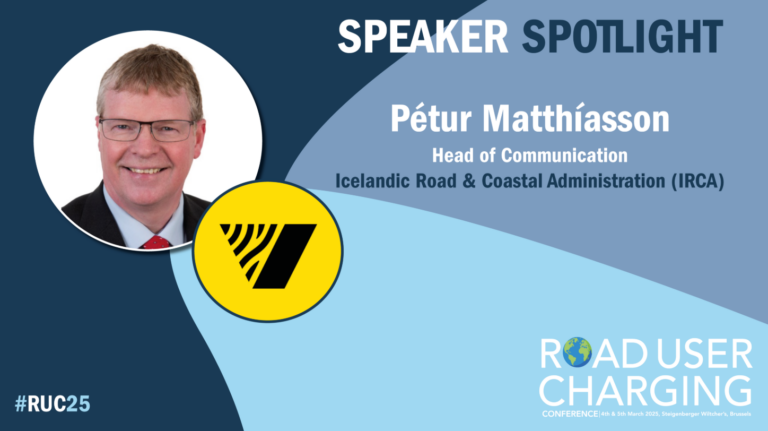As Road User Charging Conference 2025 approaches, CiTTi Magazine profiles the experts set to speak at the world-renowned event.
Taking place on 4-5 March at the Steigenberger Wiltcher’s in Brussels, Belgium, the 22nd annual Road User Charging Conference will explore the latest advancements in user-financed transportation.
The prestigious two-day event gathers industry leaders, policymakers, and innovators from around the globe. It serves as a vital forum for discussions, knowledge exchange, and peer learning on best practices for planning, financing, implementing, operating, and maintaining tolling, road usage charging, and mobility pricing schemes across motorways, highways, and urban areas.
FREE: Subscribe to the monthly Road User Charging Conference Newsletter!
One of the experts confirmed to speak at the event is Pétur Matthiasson, head of communications at Vegagerðin (Icelandic Road & Coastal Administration). A former journalist, he also serves as secretary to the board of directors and is active in international cooperation through the Nordic Road Association and the Conference of European Directors of Roads.
At the conference, Matthíasson will share insights from Iceland’s journey in implementing user charges for EVs and PHEVs, discuss the challenges of expanding road user charging to all vehicles, and explore strategies for addressing public opposition in the context of political turbulence.
 Name: Pétur Matthiasson
Name: Pétur Matthiasson
Job Role: Head of Communication
Organisation: Vegagerðin (Icelandic Road & Coastal Administration)
What is the best aspect of your job?
As head of communication in a small road administration, I enjoy a variety of responsibilities. These include managing media relations, international collaborations, creating text, videos, and social media content, maintaining our website, and even organising ribbon-cutting ceremonies for new projects. This versatility makes my work both dynamic and engaging.
What is the biggest challenge facing those with responsibility for user-financed transportation in 2025?
The greatest challenge is demonstrating how user charges can be made fairer for the public. It’s crucial to communicate that these charges should align with usage: those who use the transportation system more should pay more, and those who contribute to increased maintenance needs should cover the associated costs.
What’s your best piece of advice for those looking to implement user-financed transportation solutions?
Be transparent. Clearly explain what you’re doing, why you’re doing it, and how it will benefit the public. Openness builds trust and acceptance.
Does legislation help or hinder development in the sector?
In theory, legislation should help. However, technology often outpaces legislative awareness, which can create delays. Communication with the public and policymakers is critical to ensuring legislation supports progress rather than hindering it.
How will the business of user-financed transportation have changed by 2030?
By 2030, technology will enable precise, usage-based payments. However, infrastructure and public consensus may not yet fully support this transformation. While gradual progress is likely, a complete overhaul of the system is unlikely before 2030.
Why are you looking forward to speaking at Road User Charging Conference 2025?
The topic is fascinating, and Iceland is in the process of completely transforming its system. As an island state, our unique position makes implementation easier compared to other countries. I look forward to sharing insights from our experience, highlighting what works and what doesn’t, and contributing to the global conversation on road user charging.
Does legislation help or hinder development in the sector?
In general it should not, but as it happens technology is often introduced and put in effect long before the legislators even are aware of what is happening. So, it can hinder progress, but again, openness and communication to the public and the politicians, is of utmost importance.
How will the business of user-financed transportation have changed by 2030?
It is difficult to predict, especially in the future. The technology is there for a brave new world consisting of everyone paying exactly for what they use, but the infrastructure is not there, and the question about what the road users want may not be answered yet. There will be gradual increase of such changes, but no colossal change before 2030.
Why are you looking forward to speaking at Road User Charging Conference 2025?
It is a very interesting subject, and in my country, we are on our way to changing the system completely. Being an island state makes our method easier to implement than in most places, so I do hope that our changes will give us all information about what works and what does not.
Discover the key trends and challenges shaping the future of user-financed transportation –spanning tolling, pricing and road usage charging – at Akabo Media’s global Road User Charging Conference series. Join senior decision-makers from around the world as they tackle the issues defining the industry in Brussels (March 2025), Abu Dhabi (May 2025), Miami (September 2025), and Singapore (October 2025). Gain invaluable insights, share innovative ideas and network with global leaders driving the transformation of transportation systems. Click here to learn more and secure your place!





